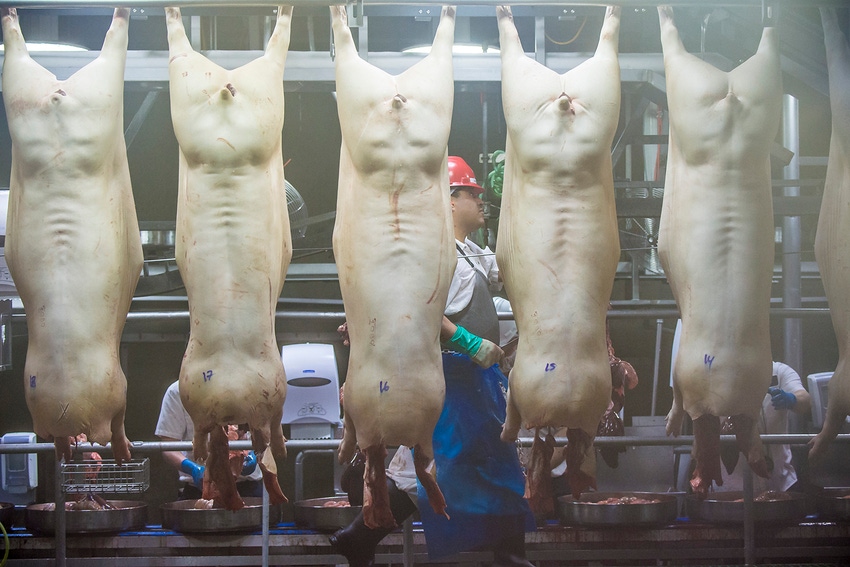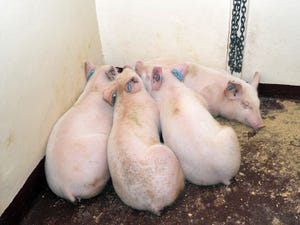Congress members call for oversight on swine slaughter rule
Last month the National Association of Federal Veterinarians announced its support for USDA's recently proposed New Swine Inspection Service.
August 5, 2019

Compiled by Ann Hess
Last week Congresswoman Rosa DeLauro (CT-03) and Senator Jeff Merkley (D-OR) sent a letter to the USDA Inspector General Phyllis Fong requesting that her office broaden its ongoing review of the agency’s proposed Swine Slaughter Inspection Rule to include food safety and animal welfare concerns. The OIG is already conducting an audit of the proposed rule in terms of worker safety.
DeLauro serves as the Vice-Chair of the House Agriculture Appropriations Subcommittee, and Merkley serves as the top Democrat on the Senate’s Agriculture Appropriations Subcommittee, both of which oversee the USDA.
“Earlier this summer, the U.S. House of Representatives passed the Fiscal Year 2020 Agriculture Appropriations bill, which included language that would prevent USDA from finalizing, issuing or implementing the Rule until OIG has presented findings on all data methods used in crafting the new swine slaughter inspection system and the Department has resolved any issues identified,” said the Members. “The Rule has significant implications for worker protection, food safety and animal welfare, clearly highlighting the need for this additional oversight.”
“According to the Centers for Disease Control and Prevention, consumption of pork causes over half a million cases of foodborne illness, and over 10% of salmonella infections, each year in the United States. USDA itself has concluded that higher line speeds result in more pathogen contamination ‘in the absence of compensating measures.’ Similarly, the agency has indicated that having plants ‘fully staffed’ with inspectors improves food safety, and that microbiological performance standards have resulted in better control of pathogens like salmonella,” continued the Members. “Yet FSIS has failed to explain why the proposed rule—despite increasing line speeds, reducing the number of inspectors and eliminating microbiological testing standards—would not hurt food safety. Moreover, the agency has failed to comply with requests for data and other information cited in its analyses of the proposed changes.”
“In support of its claim that ‘the new system is unlikely to result’ in more foodborne illness, FSIS has relied primarily on a risk assessment, entitled ‘Assessment of the Potential Change in Human Risk of Salmonella Illnesses Associated with Modernizing Inspection of Market Hog Slaughter Establishments,’” continued the Members. “FSIS instead waited until after it had published its proposed rule to conduct an external peer review, and then published the results of that peer review after the close of the comment period on the proposed rule. The peer review strongly suggests that the risk assessment is invalid, with three of the five reviewers raising fundamental objections.”
“Additionally, we are deeply concerned that USDA failed to adequately assess and consider the impacts of the proposed rule on animal welfare. FSIS cannot credibly argue that decreasing inspector oversight of the sorting of pigs while increasing the volume of animals slaughtered will not undermine animal welfare. Taken together, the available evidence indicates that, if finalized and implemented, USDA’s rule may jeopardize not only worker safety but also public health and animal welfare,” concluded the Members.
Last month the National Association of Federal Veterinarians announced its support for USDA's recently proposed New Swine Inspection Service. NAFV’s members constitute the nation’s largest block of scientific and technical expertise in the area of food safety and slaughter inspection and have determined the new system will enable a more scientific basis for ensuring food safety for the public.
Despite mischaracterization of the program by some in the media, the National Pork Producers Council says the program would truly be a step forward for the pork inspection process. USDA employees will retain their authority and be solely responsible for the entire meat inspection process. By enabling FSIS inspectors to focus on issues more pertinent to animal welfare, food safety and sanitation, the NSIS will help to provide for a safer food supply, while allowing packing companies to more effectively use their staff and resources. The U.S. pork industry has long been a global leader in offering a quality product to consumers domestically and abroad, and the NSIS program will continue that effort.
You May Also Like



